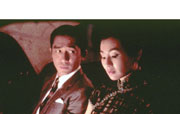IN THE CLINCH—that’s where all Hollywood love stories end up. The rule in such traditional courtship tales is that our attractive leads should at some point gaze into each other’s eyes, realize what we’ve been trying to tell them all along (You’re perfect together! Kiss her, you fool!), then fall into transcendent embrace. What we have no patience to see, what crowd-pleasing date flicks leave out, is everything in between, everything that precedes and follows the Big Moment. Wong Kar-wai understands that in those pauses, hesitations, and ellipses lies the true essence of love—the fretting and anticipation that make the payoff so powerful.
IN THE MOOD FOR LOVE
written and directed by Wong Kar-wai with Maggie Cheung and Tony Leung opens February 15 at Harvard Exit
However, in Wong’s lushly romantic portrayal of adultery in early ’60s Hong Kong, the payoff isn’t the point. That’s not to say his dreamy, evocative movie denies its lovers consummation—we just don’t witness it. As in the works of his Taiwanese counterpart Hou Hsiou-hsien, normal dramatic plot points are sidestepped in Mood, which constructs an illicit love affair, clue by clue, without showing the actual crime.
Among the rootless community of Mandarin-speaking exiles from Shanghai, Mrs. Chan (Maggie Cheung) is a secretary well accustomed to disguising the indiscretions of her boss. Adultery is in the air. With her form-fitting floral-patterned cheongsam dresses, Jackie O. hair, and gorgeous eyes, Chan is glamorous but alone in an overcrowded boarding house (her husband generally absent on business trips). Grazing past her in the camped hallways is another tenant, Chow (Tony Leung), a handsome journalist whose wife is forever working late.
Oddly, Chan and Chow’s respective spouses are always away at the exact same time—coincidence? (Our two potential lovers aren’t too quick on the uptake.) “You’re too polite,” their landlady rebukes them both separately, speaking for us as well. In other words, they’re cheating on you, so why not have a fling yourselves?
NOT SO FAST. Improvising as he shoots, Wong doesn’t hurry his lovers together in a conventional manner. Instead, we see the beginning and the end of this smoldering affair, but not the middle. There are glimpses of sordid red-curtained hotel rooms, but it’s longing, not sex, that Wong is after. “We won’t be like them,” Chan insists of their own adulterous spouses, hoping that her relationship with Chow won’t turn tawdry. Nevertheless, they must sneak around, flirting outside their rooming house while monsoon rains flood the sidewalks. No matter what their intentions, no matter their concerns about gossip and propriety, they can’t help getting wet.
As with his Chungking Express, Fallen Angels, and Happy Together, Wong is less concerned with story logic than mood and image. Music, including a Nat King Cole ballad (in Spanish), helps establish Mood‘s lyrical tone, and the highly stylized look of the film—neon lights, rain-slicked streets, figures framed through corridors and doorways—communicates character better than any dialogue or plot point. Here particularly, since the most supposedly important scenes are deliberately elided, Mood will entrance—or grow tedious—depending on your taste for such melancholy, atmospheric romance.
Once known as a slapstick actress in early Jackie Chan pictures, Cheung is almost unrecognizable in her sad, poised beauty. Her character palpably, physically pines for affection, yet holding hands with Chow is all the carnality Wong will reveal. Frequent Wong collaborator Leung (Hard-Boiled) earned a Cannes prize for his acting, which—like almost everything else about Mood—is conveyed more by suggestion than words or action. Together, the two stars form a beautiful pair whose attachment seems all the stronger for its doomed indecision.
Some may protest that nothing much happens, but Mood takes place as much in the past as the present, showing how love is felt more deeply in memory than in the fleeting moment.








